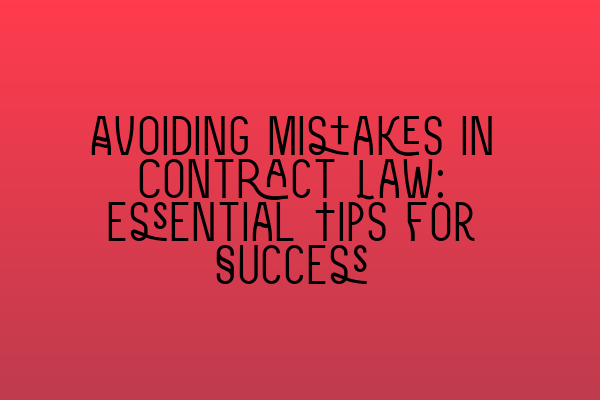Avoiding Mistakes in Contract Law:
Essential Tips for Success
Contract law plays a crucial role in various business transactions, ensuring that parties can rely on legally binding agreements. However, mistakes in contract law can lead to costly disputes and even legal battles. To help you navigate this complex area, we have compiled a list of essential tips for avoiding common pitfalls in contract law.
The Importance of Clarity
One of the most critical aspects of contract law is the principle of clarity. Unclear or ambiguous terms can leave room for interpretation and potential disputes. To avoid this, make sure your contract is drafted with utmost precision and specificity. Use plain language to convey your intentions and define key terms explicitly. Review the contract from the perspective of someone unfamiliar with the subject matter to ensure it is easily understandable.
Know Your Rights and Obligations
Before entering into a contract, it is essential to have a clear understanding of your rights and obligations. Familiarize yourself with relevant laws and regulations that govern the subject matter of the contract. Consult with a qualified solicitor to ensure you are fully aware of the legal implications and potential risks involved. This knowledge will empower you to negotiate favorable terms and protect your interests.
Consider all Elements of a Valid Contract
A valid contract requires certain elements to be present. These typically include an offer, acceptance, consideration, intention to create legal relations, capacity, and legality. Ensure that all these elements are present and clearly stated in your contract. Failing to satisfy any of these requirements can render the contract unenforceable.
Document Everything
Accurate documentation is essential in contract law. Keep a robust record of all communication related to the contract, including emails, letters, and meeting minutes. This evidence may be crucial in case of a dispute or breach of contract. Maintain a clear paper trail to support your position and protect your rights.
Consult with a Solicitor
While you may have a good understanding of contract law, consulting with a qualified solicitor is always recommended. A solicitor experienced in contract law can provide valuable guidance and help you spot potential issues that may have been overlooked. They can also review your contract and ensure it is legally sound.
Stay Updated on Legal Changes
Contract law is not static; it evolves over time. Stay updated on any changes in legislation or case law that may impact your contracts. Subscribe to legal newsletters, attend industry conferences, and consult legal resources to stay informed. This proactive approach will help you anticipate and avoid potential pitfalls.
Invest in Professional Development
Continual professional development is crucial for staying ahead in contract law. Attend workshops, seminars, and training programs specific to contract law to deepen your knowledge and improve your skills. This investment in your professional growth will pay off in terms of your ability to negotiate and draft solid contracts.
Review and Revise
Even after a contract is executed, it is essential to periodically review and revise it. Business dynamics change, and contracts may need to be updated accordingly. Regularly assess your contracts to ensure they align with your current business objectives and comply with any legal changes.
